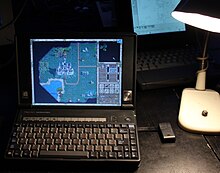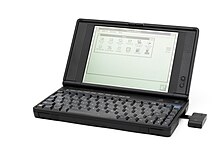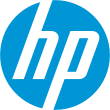HP OmniBook
 OmniBook X (2024) | |
| Developer |
|
|---|---|
| Type | Laptop |
| Lifespan |
|
| Marketing target | |
| Predecessor | 1993 (original): HP Vectra LS 2024 (revival): |
OmniBook is a line of laptop computers developed and sold by HP Inc. since 2024. It is a single brand for all consumer-oriented laptops by the company, replacing the Spectre, Envy, Pavilion and Essential lines in the United States. A previous business-oriented line under the same name was marketed by Hewlett-Packard, HP Inc.'s predecessor, between 1993 and 2002.
History
[edit]OmniBook was introduced in 1993 as a line of business-oriented laptops and subnotebooks produced by Hewlett-Packard. It succeeded the prior HP Vectra LS models of computers. It was discontinued in 2002 following the acquisition of Compaq that year,[1][2] with the Compaq Presario, HP Compaq, and HP Pavilion laptops succeeding the OmniBook line.
The OmniBook brand was then revived 22 years later in 2024 as part of HP's rebranding of its PC product lines that year. The new "Omni" brand would be used for all consumer PCs (aside from Omen), with OmniBook for laptops, OmniDesk for desktop computers, and OmniStudio for all-in-one PCs. It would replace the long-running Pavilion brand in use since 1995 among other brands in the United States.[3][4]
Models
[edit]The current lineup of the OmniBook as of 2024 is made up of five different grades; Ultra, representing the highest-grade model, followed by X, 7, 5, and 3, with the last grade being the lowest-grade model. The other HP consumer series under the "Omni" branding (OmniStudio and OmniDesk) follows the same format.[4]
Comparison table
[edit]




NOTE: This list includes the previous business-oriented models produced from 1993–2002, as well as the current consumer-oriented models from 2024–present.
| Model name |
Processor | Clock speed (MHz) |
Max. memory | LCD technology | LCD size and resolution | Release date | Ref(s). |
|---|---|---|---|---|---|---|---|
| 300 | AMD 386SX-LV | 20 | 10 MB | Monochrome STN (reflective) | 9 in, VGA | June 1993 | [5][6] |
| 425 | TI 486SLC/e | 25 | 10 MB | Monochrome STN (reflective) | 9 in, VGA | November 1993 | [7][8] |
| 430 | TI 486SLC/e | 25 | 10 MB | Monochrome STN (reflective) | 9 in, VGA | February 1994 | [9][10] |
| 530 | Intel 486SX | 33 | 12 MB | Monochrome STN (reflective) | 9 in, VGA | June 1994 | [11][12]: 240 |
| 600C | Intel i486DX4 | 75 | 16 MB | Color STN | 8.5, VGA | November 1994 | [13][14] |
| 4000 | Intel i486DX2 | 50 | 32 MB | November 1994 | [13][15][16] | ||
| 600CT | Intel i486DX4 | 75 | 16 MB | Color TFT | 9.5, VGA | July 1995 | [17] |
| 5500CT | Intel Pentium | 100 or 120 | 64 MB | Color STN | 12.1, SVGA | May 1996 | [18] |
| 5500CS | Intel Pentium | 120 or 133 | 64 MB | Color TFT | May 1996 | [18] | |
| 800CT | Intel Pentium | 133 | 48 MB | Color TFT | 10.4, SVGA | September 1996 | [19][20] |
| 800CS | Intel Pentium | 100 | 48 MB | Color TFT | 10.4, SVGA | September 1996 | [19][20] |
| 5000CT | Intel Pentium | 133 | 48 MB | Color TFT | 12.1, SVGA | September 1996 | [19] |
| 5700 | Intel Pentium MMX | 150 or 166 | 160 MB | Color TFT | 12.1, SVGA | April 1997 | [21] |
| 2000CT | Intel Pentium MMX | 133 | 64 MB | Color TFT | 12.1, SVGA | June 1997 | [22] |
| 2000CS | Intel Pentium MMX | 150 | 64 MB | Color STN | 12.1, SVGA | October 1997 | [23] |
| 3000 | Intel Pentium MMX | 233 or 266 | 144 MB | Color TFT | 13.3, XGA | November 1997 | [24][25][26] |
| 2100 | Intel Pentium MMX | 200 or 233 | 160 MB | 12.1, SVGA | April 1998 | [27][28] | |
| 3100 | Intel Pentium MMX | 266 | 160 MB | Color TFT | 13.3, XGA | April 1998 | [27] |
| 4100 | Intel Mobile Pentium II | 233 or 266 | 160 MB | Color TFT | April 1998 | [27][29] | |
| 7100 | Intel Mobile Pentium II | 266 | 288 MB | Color TFT | 14.1, XGA | April 1998 | [27][30][31] |
| Sojourn | Intel Mobile Pentium II | 233 | 64 MB | Color TFT | 12.1, SVGA | April 1998 | [a][32][33][34] |
| 7150 | Intel Mobile Pentium II | 300 | 320 MB | Color TFT | 14.1, XGA | September 1998 | [35][31] |
|
Intel Mobile Pentium II | 300 | 256 MB | Color TFT | October 1998 | [36][29] | |
| 900 |
|
160 MB | Color TFT | January 1999 | [37][38] | ||
| 900B |
|
192 MB | Color TFT | 1999 | [38] | ||
| XE |
|
256 MB | February 1999 | [39][40] | |||
| XE2 |
|
256 MB | May 1999 | [41][40] | |||
| 6000 |
|
128 MB | Color TFT | May 2000 | [42] | ||
| XE3 |
|
1 GB | Color TFT | September 2000 | [43][44] | ||
| 500 |
|
512 MB | Color TFT | 12.1, XGA | November 2000 | [45][46] | |
| 6100 | Intel Mobile Pentium III | 1133 | 512 MB | Color TFT | August 2001 | [47] | |
| xt6200 | Intel Pentium 4 M | 1700 | 1 GB | Color TFT | March 2002 | [48] | |
| vt6200 | Intel Pentium 4 M | 1700 | 1 GB | Color TFT | March 2002 | [48] | |
| X | Qualcomm Snapdragon X Elite | 3400 (12 cores) | 32 GB | Color OLED (touchscreen) | 14, 2.2K (2240 × 1400 pixels) | May 2024 | [49] |
OmniBook 300
[edit]
The HP OmniBook 300 (OB300) is a subnotebook released in June 1993 as one of the first models of the original OmniBook line. It weighed only 2.9 pounds and measured 1.4 × 6.4 × 11.1 inches. It is powered by an AMD 386SX-LV processor, featured a full-size keyboard, a pop-up computer mouse (This same pop-up mouse would later be used in the OmniBook 800CT; see the image above), and a 9-inch VGA screen.[50][51][52] It had two PCMCIA slots for additional memory, modem, network cards or other peripherals. It was sold in three storage configurations: no mass storage (F1030A at US$1,515), 10 MB flash memory disk (F1031A at US$2,375), or 40 MB hard drive (F1032A at US$1,950). Compared to the hard drive, the flash memory disk reduced the weight and storage capacity of the notebook with increased battery life. One of its outstanding features was a technology known as "Instant On".
The OmniBook 300 came with slimmed-down copies of MS-DOS 5.0 and Windows 3.1. Due to storage limitations, the OmniBook 300 included both Microsoft Excel and Microsoft Word pre-installed in ROM, a practice that was and still remains unusual to this day.[53] The "International English" version of the OmniBook 300 used code page 850 (rather than the more common code page 437) as hardware code page.
OmniBook X
[edit]The HP OmniBook X is a notebook computer announced in May 2024 as the first model of the revived OmniBook line. It is powered by an ARM64-based Qualcomm Snapdragon X Elite processor, has a 2240 x 1400 resolution touchscreen IPS display, 16 GB or 32 GB memory, and either a 512 GB, 1 TB or 2 TB PCIe 4.0 solid-state drive. It is marketed as an "AI PC" featuring Microsoft Copilot. [49][54]
Notes
[edit]- ^ Badge-engineered Mitsubishi Pedion
See also
[edit]References
[edit]- ^ "The new HP: You are what you eat". CNET. Retrieved November 18, 2024.
- ^ "HP drops Omnibooks after merger | IT World Canada News". www.itworldcanada.com. May 16, 2002. Retrieved November 18, 2024.
- ^ Cranz, Alex (May 20, 2024). "HP is simplifying its laptop lineup and embracing the AI PC". The Verge. Retrieved May 20, 2024.
- ^ a b Harding, Scharon (May 20, 2024). "HP resurrects '90s OmniBook branding, kills Spectre, Dragonfly". Ars Technica. Retrieved May 20, 2024.
- ^ Lee, Yvonne L. (June 7, 1993). "OmniBook speeds start-up, shutdown". InfoWorld. 15 (23). IDG Publications: 29 – via Google Books.
- ^ Angus, Earl (December 20, 1993). "Hewlett-Packard OmniBook 300". InfoWorld. 15 (51). IDG Publications: 69 – via Google Books.
- ^ Polilli, Steve (November 8, 1993). "HP touts infrared spec, unveils 486 OmniBook". InfoWorld. 15 (45). IDG Publications: 6 – via Google Books.
- ^ Bertolucci, Jeff (January 1994). "OmniBook Gets 486". PC World. 12 (1). IDG Publications: 80 – via the Internet Archive.
- ^ Lee, Yvonne L. (February 14, 1994). "HP will offer OmniBook sans ROM versions of Word, Excel". InfoWorld. 16 (7). IDG Publications: 14 – via Google Books.
- ^ Staff writer (April 1994). "More for Less, and Less for More". PC World. 12 (4). IDG Publications: 72 – via the Internet Archive.
- ^ Lee, Yvonne L. (June 13, 1994). "HP releases enhanced OmniBook 350". InfoWorld. 16 (24). IDG Publications: 40 – via Google Books.
- ^ Bass, Steve (September 1994). "Top Picks for the Home Office". PC World. 12 (9). IDG Publications: 239–240 – via the Internet Archive.
- ^ a b Zimmerman, Michael R. (November 21, 1994). "HP Adds Color, Full-sized Units to OmniBook Line". PC Week. 11 (46). Ziff-Davis: 53 et seq. – via Gale.
- ^ Caton, Michael (November 14, 1994). "OmniBook Elevates Subnotebook Class". PC Week. 11 (45). Ziff-Davis: 21 et seq. – via Gale.
- ^ Francis, Bob (November 14, 1994). "High-end HP OmniBook notebook debuts". InfoWorld. 16 (46). IDG Publications: 47 – via Google Books.
- ^ PC Portátil HP OmniBook 3100 Venta en 1 Minuto [HP OmniBook 2100 Laptop PC Sale in 1 Minute] (PDF) (in Spanish). Hewlett-Packard. 1998. Archived from the original (PDF) on February 12, 2004.
- ^ Lee, Yvonne L.; Bob Francis (July 17, 1995). "NEC and HP add expansion options, memory". InfoWorld. 17 (29). IDG Publications: 16 – via Google Books.
- ^ a b "New notebooks: HP expands new OmniBook 5500 notebook PC line". EDGE. 7. EDGE Publishing: 19. May 27, 1996 – via Gale.
- ^ a b c April, Carolyn A. (September 16, 1996). "OmniBooks pack power lightly". InfoWorld. 18 (38). IDG Publications: 33 – via Google Books.
- ^ a b Letson, Russell (April 1997). "Lightweight, heavy power". Home Office Computing. 15 (4). Line56: 30 et seq. – via Gale.
- ^ Briody, Dan (April 21, 1997). "HP shifts mobile focus to manageability". InfoWorld. 19 (16). IDG Publications: 31 – via Gale.
- ^ Briody, Dan (June 2, 1997). "Dell, HP aim notebook lines at the desktop". InfoWorld. 19 (22). IDG Publications: 19 – via Google Books.
- ^ Staff writer (October 27, 1997). "New notebook: HP to extend value OmniBook Notebook PC line". EDGE. 8. EDGE Publishing: 11 – via Gale.
- ^ Girard, Kim (November 3, 1997). "Dell, HP target corporate users with thinner, lighter laptops". Computerworld. 31 (44). IDG Publications: 17 – via Gale.
- ^ Briody, Dan (January 19, 1998). "HP notebooks make corporate bid". InfoWorld. 20 (3). IDG Publications: 31 – via Gale.
- ^ HP OmniBook 3000 Reference Guide (PDF). Hewlett-Packard. 1998. pp. 9-3–9-4. Archived from the original (PDF) on February 28, 2007.
- ^ a b c d Briody, Dan (April 27, 1998). "HP's notebooks, PCs focus on manageability". InfoWorld. 20 (17). IDG Publications: 3 – via Google Books.
- ^ PC Portátil HP OmniBook 2100 Venta en 1 Minuto [HP OmniBook 2100 Laptop PC Sale in 1 Minute] (PDF) (in Spanish). Hewlett-Packard. 1998. Archived from the original (PDF) on February 12, 2004.
- ^ a b HP OmniBook 4100/4150 Reference Guide (PDF). Hewlett-Packard. 1998. pp. 8-3–8-4. Archived from the original (PDF) on May 28, 2006.
- ^ Spooner, John G. (February 2, 1998). "OmniBook Refresher". PC Week. 15 (5). Ziff-Davis: 10 – via Gale.
- ^ a b HP OmniBook 7100/7150 Reference Guide (PDF). Hewlett-Packard. 1998. pp. 8-3–8-4. Archived from the original (PDF) on March 28, 2003.
- ^ Kvitka, Andre (March 30, 1998). "HP's Sojourn reaffirms 'thin is in'". InfoWorld. 20 (13). IDG Publications: 1, 99 – via Gale.
- ^ Staff writer (November 23, 1998). "Sojourn ends its travels". PC Week. Ziff-Davis: 6 – via Gale.
- ^ HP OmniBook Sojourn Troubleshooting Guide (PDF). Hewlett-Packard. 1998. p. 1-3. Archived from the original (PDF) on December 7, 2008.
- ^ Staff writer (September 9, 1998). "Raft of 300 MHz PII Notebooks Hits Market". Newsbytes. The Washington Post Company: NEW09090036 – via Gale.
- ^ Caton, Michael (November 2, 1998). "...But Latest OmniBook Doesn't Stand Out". PC Week. Ziff-Davis: 60 – via Gale.
- ^ Staff writer (January 18, 1999). "Pipeline". InfoWorld. 21 (3). IDG Publications: 29 – via Google Books.
- ^ a b HP OmniBook 900 Reference Guide. Hewlett-Packard. 1999. pp. 128–129. Archived from the original on June 14, 2016.
- ^ Staff writer (February 1, 1999). "Pipeline". InfoWorld. 21 (5). IDG Publications: 25 – via Google Books.
- ^ a b Tips for Using the OmniBook XE and XE2. Hewlett-Packard. 1999. pp. 43–46. Archived from the original on March 22, 2016.
- ^ Schwartz, Ephraim (May 3, 1999). "Customers clamor for mobile diversity". InfoWorld. 21 (18). IDG Publications: 16 – via Gale.
- ^ "HP Increases Computing Mobility, Unveils High-Performance HP OmniBook 6000 Notebook PC, Security and Wireless Initiatives". EDGE. EDGE Publishing: 1. May 1, 2000 – via Gale.
- ^ Thomas, Daniel (September 21, 2000). "HP to offer wireless LAN on notebooks". Computer Weekly. TechTarget: 60 – via Gale.
- ^ HP OmniBook XE3 Notebook PC (PDF). Hewlett-Packard. 2000. Archived from the original (PDF) on June 30, 2003.
- ^ Popovich, Ken (November 13, 2000). "Hardware takes the stage". eWeek. QuinStreet: 20 – via Gale.
- ^ HP OmniBook 500 Notebook PC (PDF). Hewlett-Packard. January 2002. Archived from the original (PDF) on July 1, 2003.
- ^ Neel, Dan (August 6, 2001). "Laptops sport new Intel chip". InfoWorld. 23 (32). IDG Publications: 20 – via Gale.
- ^ a b Shaw, Keith (March 11, 2002). "The arrival of Penium 4 notebooks". Network World. IDG Publications: 56 – via Gale.
- ^ a b Low, Cherlynn (May 20, 2024). "HP Omnibook X hands-on: Vintage branding in the new era of AI". Engadget. Yahoo! Inc. Archived from the original on May 20, 2024.
- ^ "HP Virtual Museum: Hewlett-Packard OmniBook 300, 1993". Hewlett-Packard. Retrieved February 20, 2012.
- ^ "The OmniBook 600: Cute but Quirky". Cs.hmc.edu. Retrieved February 20, 2012.
- ^ "Hardware". The HP Palmtop Paper. Thaddeus Computing. Retrieved February 20, 2012.
- ^ "HP Computer Museum". Hpmuseum.net. Retrieved February 20, 2012.
- ^ Wilson, Ben; published, Cale Hunt (May 20, 2024). "The new OmniBook X AI PC powered by Snapdragon X represents a whole new era for HP laptops". Windows Central. Retrieved November 20, 2024.
External links
[edit]- Official HP pages
- OmniBook search results on HP's website[permanent dead link]
- OmniBook support page, with more extensive list of models here [1]
- Others
- HP OmniBook Information Archived September 20, 2008, at the Wayback Machine by Kieran Garbutt
- HP OmniBook site by Sean McCreary

